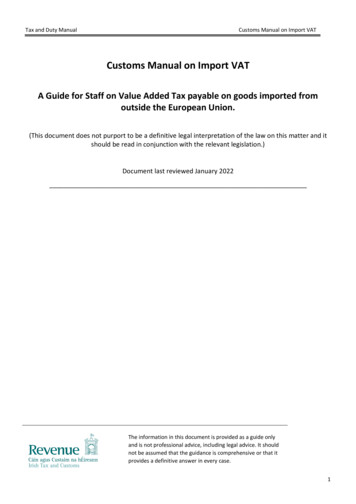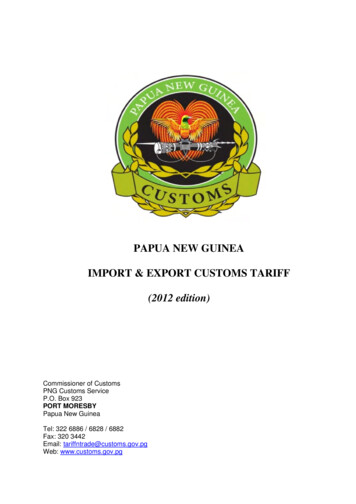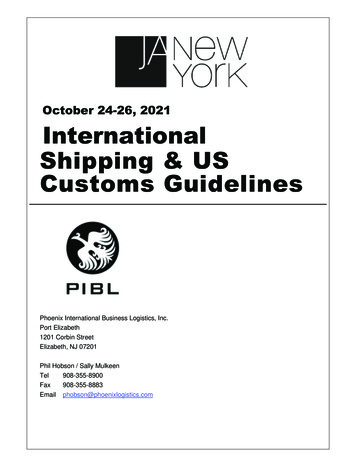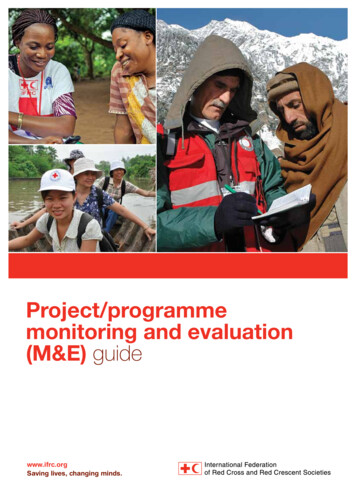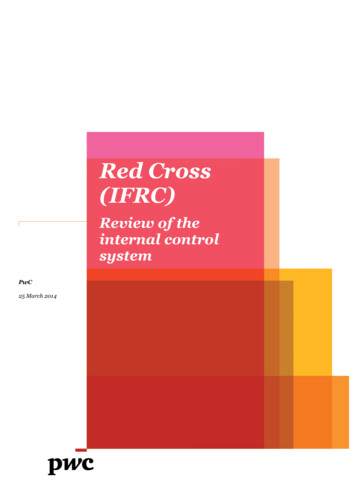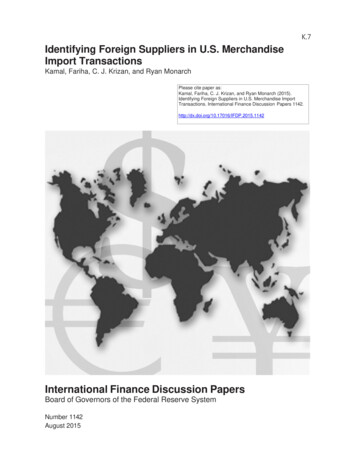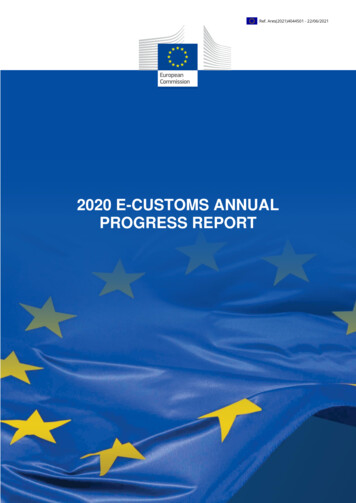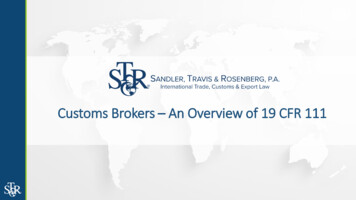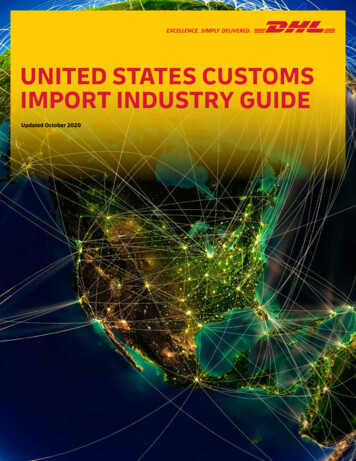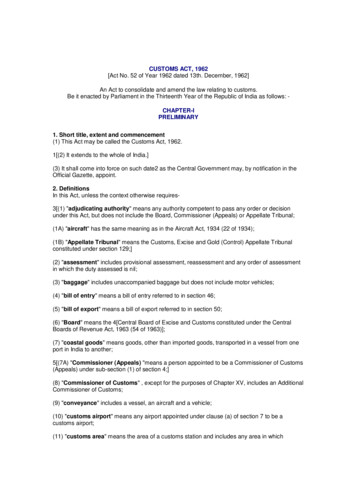
Transcription
CUSTOMS ACT, 1962[Act No. 52 of Year 1962 dated 13th. December, 1962]An Act to consolidate and amend the law relating to customs.Be it enacted by Parliament in the Thirteenth Year of the Republic of India as follows: CHAPTER-IPRELIMINARY1. Short title, extent and commencement(1) This Act may be called the Customs Act, 1962.1[(2) It extends to the whole of India.](3) It shall come into force on such date2 as the Central Government may, by notification in theOfficial Gazette, appoint.2. DefinitionsIn this Act, unless the context otherwise requires3[(1) "adjudicating authority" means any authority competent to pass any order or decisionunder this Act, but does not include the Board, Commissioner (Appeals) or Appellate Tribunal;(1A) "aircraft" has the same meaning as in the Aircraft Act, 1934 (22 of 1934);(1B) "Appellate Tribunal" means the Customs, Excise and Gold (Control) Appellate Tribunalconstituted under section 129;](2) "assessment" includes provisional assessment, reassessment and any order of assessmentin which the duty assessed is nil;(3) "baggage" includes unaccompanied baggage but does not include motor vehicles;(4) "bill of entry" means a bill of entry referred to in section 46;(5) "bill of export" means a bill of export referred to in section 50;(6) "Board" means the 4[Central Board of Excise and Customs constituted under the CentralBoards of Revenue Act, 1963 (54 of 1963)];(7) "coastal goods" means goods, other than imported goods, transported in a vessel from oneport in India to another;5[(7A) "Commissioner (Appeals) "means a person appointed to be a Commissioner of Customs(Appeals) under sub-section (1) of section 4;](8) "Commissioner of Customs" , except for the purposes of Chapter XV, includes an AdditionalCommissioner of Customs;(9) "conveyance" includes a vessel, an aircraft and a vehicle;(10) "customs airport" means any airport appointed under clause (a) of section 7 to be acustoms airport;(11) "customs area" means the area of a customs station and includes any area in which
imported goods or export goods are ordinarily kept before clearance by customs authorities;(12) "customs port" means any port appointed under clause (a) of section 7 to be a customs port6[and includes a place appointed under clause (aa) of that section to be an inland containerdepot];(13) "customs station" means any customs port, customs airport or land customs station;(14) "dutiable goods" means any goods which are chargeable to duty and on which duty has notbeen paid:(15) "duty" means a duty of customs leviable under this Act;(16) "entry" in relation to goods means an entry made in a bill of entry, shipping bill or bill ofexport and includes in the case of goods imported or to be exported by post, the entry referred toin section 82 or the entry made under the regulations made under section 84;(17) "examination", in relation to any goods, includes measurement and weighment thereof;(18) "export", with its grammatical variations and cognate expressions, means taking out of Indiato a place outside India;(19) "export goods" .means any goods which are to be taken out of India to a place outsideIndia;(20) "exporter", in relation to any goods at any time between their entry for export and the timewhen they are exported, includes any owner or any person holding himself out to be the exporter;(21) "foreign-going vessel or aircraft" means any vessel or aircraft for the time being engagedin the carriage of goods or passengers between any port or airport in India and any port or airportoutside India, whether touching any intermediate port or airport in India or not, and includes(i) any naval vessel of a foreign government taking part in any naval exercises;(ii) any vessel engaged in fishing or any other operations outside the territorial waters of India;(iii) any vessel or aircraft proceeding to a place outside India for any purpose whatsoever;7[(21A) "Fund" means the Consumer Welfare Fund established under section 12C of the CentralExcises and Salt Act, 1944 (1 of 1944);](22) "goods" includes(a) vessels, aircraft and vehicles;(b) stores;(c) baggage;(d) currency and negotiable instruments; and(e) any other kind of movable property;(23) "import", with its grammatical variations and cognate expressions, means bringing into Indiafrom a place outside India;
(24) "import manifest" or "import report" means the manifest or report required to be deliveredunder section 30;(25) "imported goods" means any goods brought into India from a place outside India but doesnot include goods which have been cleared for home consumption;(26) "importer", in relation to any goods at any time between their importation and the time whenthey are cleared for home consumption, includes any owner or any person holding himself out tobe the importer;(27) "India" includes the territorial waters of India;(28) "Indian customs waters " means the 8[waters extending into the sea up to the limit ofcontiguous zone of India under section 5 of the Territorial Waters, Continental Shelf, ExclusiveEconomic Zone and other Maritime Zones Act, 1976 (80 of 1976)] and includes any bay, gulf,harbour, creek, or tidal river;(29) "land customs station" means any place appointed under clause (b) of section 7 to be aland customs station;(30) "market price", in relation to any goods, means the wholesale price of the goods in theordinary course of trade in India;(31) "person-in-charge" means(a) in relation to a vessel, the master of the vessel;(b) in relation to an aircraft, the commander or pilot-in-charge of the aircraft;(c) in relation to a railway train, the conductor, guard or other person having the chief direction ofthe train;(d) in relation to any other conveyance, the driver or other person-in-charge of the conveyance;(32) "prescribed" means prescribed by regulations made under this Act;(33) "prohibited goods" means any goods the import or export of which is subject to anyprohibition under this Act or any other law for the time being in force but does not include anysuch goods in respect of which the conditions subject to which the goods are permitted to beimported or exported have been complied with;(34) "proper officer", in relation to any functions to be performed under this Act, means theofficer of customs who is assigned those functions by the Board or the 5[Commissioner ofCustoms;](35) "regulations" means the regulations made by the Board under any provision of this Act;(36) "rules" means the rules made by the Central Government under any provision of this Act;(37) "shipping bill" means a shipping bill referred to in section 50;(38) "stores" means goods for use in a vessel or aircraft and includes fuel and spare parts andother articles of equipment, whether or not for immediate fitting;(39) "smuggling", in relation to any goods, means any act or omission which will render suchgoods liable to confiscation under section 111 or section 113;
(40) "tariff value", in relation to any goods, means the tariff value fixed in respect thereof undersub-section (2) of section 14;(41) "value", means relation to any goods, means the value thereof determined in accordancewith the provisions of sub-section (1) of section 14;(42) "vehicle" means conveyance of any kind used on land and includes a railway vehicle;(43) "warehouse" means a public warehouse appointed under section 57 or private ware houselicensed under section 58;(44) "warehoused goods" means goods deposited in a warehouse;(45) "warehousing station "means a place declared as a warehousing station under section 9.CHAPTER IIOFFICERS OF CUSTOMS5[3.Classes of officers of customsThere shall be the following classes of officers of customs, namely:(a) Chief Commissioners of Customs;(b) Commissioner of Customs;(c) Commissioners of Customs (Appeals);9[(cc) Joint Commissioners of Customs;](d) Deputy Commissioners of Customs;(e) Assistant Commissioners of Customs; and(f) such other class of officers of customs as may be appointed for the purposes of this Act.]5[4. Appointment of officers of customs(1) The Central Government may appoint such persons as it thinks fit to be officers of customs.(2) Without prejudice to the provisions of sub-section (1),the Central Government may authorisethe Board, a Commissioner of Customs or a Deputy or Assistant Commissioner of Customs 9[orDeputy Commissioner of Customs] to appoint officers of customs below the rank of AssistantCommissioner of Customs 9[or Deputy Commissioner of Customs].]5. Powers of officers of customs(1) Subject to such conditions and limitations as the Board may impose, an officer of customsmay exercise the powers and discharge the duties conferred or imposed on him under this Act.(2) An officer of customs may exercise the powers and discharge the duties conferred or imposedunder this Act on any other officer of customs who is subordinate to him.(3) Notwithstanding anything contained in this section 5[a Commissioner (Appeals)] shall notexercise the powers and discharge the duties conferred or imposed on an officer of customsother than those specified in Chapter XV and section 108.
6. Entrustment of functions of Board and Customs Officers on certain other officersThe Central Government may, by notification in the Official Gazette, entrust either conditionally orunconditionally to any officer of the Central or the State Government or a local authority anyfunctions of the Board or any officer of customs under this Act.CHAPTER IIIAPPOINTMENT OF CUSTOMS PORTS, AIRPORTS, WAREHOUSING STATIONS, ETC.7. Appointment of customs ports, airports, etc.The Central Government may, by notification in the Official Gazette, appoint(a) the ports and airports which alone shall be customs ports or customs airports for theunloading of imported goods and the loading of export goods or any class of such goods;6[(aa) the places which alone shall be inland container depots for the unloading of importedgoods and the loading of export goods or any class of such goods;](b) the places which alone shall be land customs stations for the clearance of goods imported orto be exported by land or inland water or any class of such goods.(c) the routes by which alone goods or any class of goods specified in the notification may passby land or inland waters into or out of India, or to or from any land customs station from or to anyland frontier;(d) the ports which alone shall be coastal ports for the carrying on of trade in coastal goods or anyclass of such goods with all or any specified ports in India.8. Power to approve landing places and specify limits of customs areaThe 5[Commissioner of Customs] may(a) approve proper places in any customs port or customs airport or coastal port for the unloadingand loading of goods or for any class of goods;(b) specify the limits of any customs area.9. Power to declare places to be warehousing stationsThe Board may, by notification in the Official Gazette, declare places to be warehousing stationsat which alone public warehouses may be appointed and private warehouses may be licensed.10. Appointment of boarding stationsThe 5[Commissioner of Customs] may, by notification in the Official Gazette, appoint, in or nearany customs port, a boarding station for the purpose of boarding of, or disembarkation from,vessels by officers of customs.CHAPTER IVPROHIBITIONS ON IMPORTATION AND EXPORTATION OF GOODS11. Power to prohibit importation or exportation of goods(1) If the Central Government is satisfied that it is necessary so to do for any of the purposesspecified in sub-section (2), it may, by notification in the Official Gazette, prohibit either absolutelyor subject to such conditions (to be fulfilled before or after clearance) as may be specified in thenotification, the import or export of goods of any specified description.(2) The purposes referred to in sub-section (1) are the following:(a) the maintenance of the security of India;
(b) the maintenance of public order and standards of decency or morality;(c) the prevention of smuggling;(d) the prevention of shortage of goods of any description;(e) the conservation of foreign exchange and the safeguarding of balance of payments;(f) the prevention of injury to the economy of the country by the uncontrolled import or export ofgold or silver;(g) the prevention of surplus of any agricultural product or the product of fisheries;(h) the maintenance of standards for the classification, grading or marketing of goods ininternational trade;(i) the establishment of any industry;(j) the prevention of serious injury to domestic production of goods of any description;(k) the protection of human, animal or plant life or health;(1) the protection of national treasures of artistic, historic or archaeological value;(m) the conservation of exhaustible natural resources;(n) the protection of patents, trademarks and copyrights;(o) the prevention of deceptive practices;(p) the carrying on of foreign trade in any goods by the State, or by a corporation owned orcontrolled by the State to the exclusion, complete or partial, of citizens of India.(q) the fulfilment of obligations under the Charter of the United Nations for the maintenance ofinternational peace and security;(r) the implementation of any treaty, agreement or convention with any country;(s) the compliance of imported goods with any laws which are applicable to similar goodsproduced or manufactured in India;(t) the prevention of dissemination of documents containing any matter which is likely toprejudicially affect friendly relations with any foreign State or is derogatory to national prestige;(u) the prevention of the contravention of any law for the time being in force; and(v) any other purpose conducive to the interests of the general public.10[CHAPTER IVA : DETECTION OF ILLEGALLY IMPORTED GOODS AND PREVENTION OFTHE DISPOSAL THEREOF11A. DefinitionsIn this Chapter, unless the context otherwise requires,(a) "illegal import" means the import of any goods in contravention of the provisions of this Act or
any other law for the time being in force;(b) "intimated place" means a place intimated under sub-section (1), sub-section (2) or subsection (3), as the case may be, of section 11C;(c) "notified date", in relation to goods of any description, means the date on which thenotification in relation to such goods is issued under section 11B;(d) "notified goods" means goods specified in the notification issued under section 11B.11B. Power of Central Government to notify goodsIf, having regard to the magnitude of the illegal import of goods of any class or description, theCentral Government is satisfied that it is expedient in the public interest to take special measuresfor the purpose of checking the illegal import, circulation or disposal of such goods, or facilitatingthe detection of such goods, it may, by notification in the Official Gazette, specify goods of suchclass or description.11C. Persons possessing notified goods to intimate the place of storage, etc.(1) Every person who owns, possesses or controls, on the notified date, any notified goods, shall,within seven days from that date, delivery to the proper officer a statement (in such form, in suchmanner and containing such particulars as may be specified by rules made in this behalf) inrelation to the notified goods owned, possessed or controlled by him and the place where suchgoods are kept or stored.(2) Every person who acquires, after the notified date, any notified goods, shall, before makingsuch acquisition, deliver to the proper officer an intimation containing the particulars of the placewhere such goods are proposed to be kept or stored after such acquisition and shall, immediatelyon such acquisition, deliver to the proper officer a statement (in such form, in such manner andcontaining such particulars as may be specified by the rules made in this behalf, in relation to thenotified goods acquired by him:PROVIDED that a person who has delivered a statement, whether under sub-section (1) or subsection (2) in relation to any notified goods, owned, possessed, controlled or acquired by him,shall not be required to deliver any further statement in relation to any notified goods acquired byhim, after the date of delivery of the said statement, so long as the notified goods so acquired arekept or stored at the intimated place.(3) If any person intends to shift any notified goods to any place other than the intimated place, heshall, before taking out such goods from the intimated place, deliver to the proper officer anintimation containing the particulars of the place to which such goods are proposed to be shifted.(4) No person shall, after the expiry of seven days from the notified date, keep or store anynotified goods at any place other than the intimated place.(5) Where any notified goods have been sold or transferred, such goods shall not be taken fromone place to another unless they are accompanied by the voucher referred to in section 11F.(6) No notified goods (other than those which have been sold or transferred) shall be taken fromone place to another unless they are accompanied by a transport voucher (in such form andcontaining such particulars as may be specified by the rules made in this behalf) prepared by thepersons owning, possessing or controlling such goods.11D. Precautions to be taken by persons acquiring notified goodsNo person shall acquire (except by gift or succession, from any other individual in India), after thenotified date, any notified goods-
(i) unless such goods are accompanied by,(a) the voucher referred to in section 11F or the memorandum referred to in sub-section (2) ofsection 11G, as the case may be; or(b) in the case of a person who has himself imported any goods, any evidence showing clearanceof such goods by the customs authorities; and(ii) unless he has taken, before acquiring such goods from a person other than a dealer having afixed place of business, such reasonable steps as may be specified by rules made in this behalf,to ensure that the goods so acquired by him are not goods which have been illegally imported.11E. Persons possessing notified goods to maintain accounts(1) Every person who, on or after the notified date, owns, possesses, controls or acquires anynotified goods shall maintain (in such form and in such manner as may be specified by rulesmade in this behalf) a true and complete account of such goods and shall, as often as heacquires or parts with any notified goods, made an entry in the said account in relation to suchacquisition or parting with, and shall also state therein the particulars of the persons from whomsuch goods have been acquired or in whose favour such goods have been parted with, as thecase may be, and such account shall be kept, along with the goods, at the place of storage of thenotified goods to which such accounts relate:PROVIDED that it shall not be necessary to maintain separately accounts in the form and mannerspecified by the rules made in this behalf in the case of a person who is already maintainingaccounts which contain the particulars specified by the said rules.(2) Every person who owns, possesses or controls any notified goods and who uses any suchgoods for the manufacture of any other goods, shall maintain (in such form, in such manner andcontaining such particulars as may be specified by rules made in this behalf) a true and completeaccount of the notified goods so used by him and shall keep such account at the intimated place.11F. Sale, etc, of notified goods to be evidenced by vouchersOn and from the notified date, no person shall sell or otherwise transfer any notified goods,unless every transaction in relation to the sale or transfer of such goods is evidenced by avoucher in such form and containing such particulars as may be specified by rules made in thisbehalf.11G. Sections 11C, 11E, and 11F not to apply to goods in personal use(1) Nothing in sections 11C , 11E and 11F shall apply to any notified goods which are(a) in personal use of the person by whom they are owned, possessed or controlled, or(b) kept in the residential premises of a person for his personal use.(2) If any person, who is in possession of any notified goods referred to in sub-section (1), sells,or otherwise transfers for a valuable consideration, any such goods, he shall issue to thepurchaser or transferee, as the case may be, a memorandum containing such particulars as maybe specified by the rules made in this behalf and no such goods shall be taken from one place toanother unless they are accompanied by the said memorandum.CHAPTER IV BPREVENTION OR DETECTION OF ILLEGAL EXPORT OF GOODS11H. Definitions
In this Chapter, unless the context otherwise requires,(a) "illegal export" means the export of any goods in contravention of the provisions of this Act orany other law for the time being in force;(b) "intimated place" means a place intimated under sub-section (1), sub-section (2) or subsection (3), as the case may be, of section l1J;(c) "specified area" includes the Indian customs waters, and such inland area, not exceedingone hundred kilometres in width from any coast or other border of India, as the CentralGovernment may, having regard to the vulnerability of that area to smuggling, by notification inthe Official Gazette, specify in this behalf:PROVIDED that where a part of any village, town or city falls within a specified area, the whole ofsuch village, town or city shall, notwithstanding that the whole of it is not within one hundredkilometres from any coast or other border of India, be deemed to be included in such specifiedarea;(d) "specified date", in relation to specified goods, means the date on which any notification isissued under section 11-I in relation to those goods in any specified area;(e) "specified goods" means goods of any description specified in the notification issued undersection 11-I in relation to a specified area.11-I. Power of Central Government to specify goodsIf, having regard to the magnitude of the illegal export of goods of any class or description, theCentral Government is satisfied that it is expedient in the public interest to take special measuresfor the purpose of checking the illegal export or facilitating the detection of goods which are likelyto be illegally exported, it may, by notification in the Official Gazette, specify goods of such classor description.11J. Persons possessing specified goods to intimate the place of storage, etc.(1) Every person who owns, possesses or controls, on the specified date, any specified goods,the market price of which exceeds fifteen thousand rupees shall, within seven days from thatdate, deliver to the proper officer an intimation containing the particulars of the place where suchgoods are kept or stored within the specified area.(2) Every person who acquires (within the specified area), after the specified date, any specifiedgoods,(i) the market price of which, or(ii) the market price of which together with the market price of any specified goods of the sameclass or description, if any, owned, possessed or controlled by him on the date of suchacquisition, exceeds fifteen thousand rupees shall, before making such acquisition, deliver to theproper officer an intimation containing the particulars of the place where such goods areproposed to be kept or stored after such acquisition:PROVIDED that a person who has delivered an intimation, whether under sub-section(1) or sub-section (2), in relation to any specified goods, owned, possessed, controlled oracquired by him, shall not be required to deliver any further intimation so long as the specifiedgoods are kept or stored at the intimated place.(3) If any person intends to shift any specified goods to which sub-section (1) or sub-section (2)applies, to any place other than the intimated place, he shall, before taking out such goods from
the intimated place, deliver to the proper officer an intimation containing the particulars of theplace to which such goods are proposed to be shifted.(4) No person shall, after the expiry of seven days from the specified date, keep or store anyspecified goods to which sub-section (1) or sub-section (2) applies, at any place other than theintimated place.11K. Transport of specified goods to be covered by vouchers(1) No specified goods shall be transported from, into or within any specified area or loaded onany animal or conveyance in such area, unless they are accompanied by a transport voucher (insuch form and containing such particulars as may be specified by rules made in this behalf)prepared by the person owning, possessing, controlling or selling such goods:PROVIDED that no transport voucher shall be necessary for the transport, within a village, townor city, of any specified goods the market price of which, on the date of transport, does notexceed one thousand rupees.(2) Notwithstanding anything contained in sub-section (1), where the Central Government, afterconsidering the nature of any specified goods, the time, mode, route and the market price of thegoods intended to be transported, the purpose of the transportation and the vulnerability of thespecified area with regard to the illegal export of such goods, is satisfied that it is expedient in thepublic interest so to do, it may(i) by notification in the Official Gazette, specify goods of such class or description and of amarket price exceeding such sum as that government may notify; and different sums in relation tothe specified goods of the same class or description, or different classes or descriptions, may benotified for the same specified area or for different specified areas, and(ii) direct that no person shall transport any goods so specified unless the transport voucher inrelation to them has been countersigned by the proper officer.11L. Persons possessing specified goods to maintain accounts(1) Every person who, on or after the specified date, owns, possesses or controls, within aspecified area, any specified goods of a market price exceeding fifteen thousand rupees, shallmaintain (in such form and in such manner as may be specified by rules made in this behalf) atrue and complete account of such goods and shall, as often as he acquires or parts with anyspecified goods, make an entry in the said account in relation to such acquisition or parting with,and shall also state therein the particulars of the person from whom such goods have beenacquired or in whose favour such goods have been parted with, as the case may be, and suchaccount shall be kept, along with the goods, at the place of storage of the specified goods towhich such accounts relate:PROVIDED that it shall not be necessary to maintain separately accounts in the form and mannerspecified by rules made in this behalf in the case of a person who is already maintaining accountswhich contain the particulars specified by the said rules.(2) Every person who owns, possesses or controls any specified goods to which the provisions ofsub-section (1) apply, and who uses any such goods for the manufacture of any other goods,shall maintain (in such form, in such manner and containing such particulars as may be specifiedby rules made in this behalf) a true and complete account of the specified goods so used by himand shall keep such account at the intimated place.(3) If at any time, on a verification made by a proper officer, it is found that any specified goodsowned, possessed or controlled by a person are less in quantity than the stock of such goods asshown, at the time of such verification, in the account referred to in sub-section (1), read with theaccounts referred to in sub-section (2), it shall be presumed, unless the contrary is proved, that
such goods, to the extent that they are less than the stock shown in the said accounts, have beenillegally exported and that the person owning, possessing or controlling such goods has beenconcerned with the illegal export thereof.11M. Steps to be taken by persons selling or transferring any specified goodsExcept where he receives payment by cheque drawn by the purchaser, every person who sells orotherwise transfers within any specified area, any specified goods, shall obtain, on his copy of thesale or transfer voucher, the signature and full postal address of the person to whom such a saleor transfer is made and shall also take such other reasonable steps as may be specified by rulesmade in this behalf to satisfy himself as to the identity of the purchaser or the transferee, as thecase may be, and if after an inquiry made by a proper officer, it is found that the purchaser or thetransferee, as the case may be, is not either readily traceable or is a fictitious person, it shall bepresumed, unless the contrary is proved, that such goods have been illegally exported and theperson who had sold or otherwise transferred such goods had been concerned in such illegalexport:PROVIDED that nothing in this section shall apply to petty sales of any specified goods if theaggregate market price obtained by such petty sales, made in the course of a day, does notexceed two thousand and five hundred rupees.Explanation : In this section "petty sale" means a sale at a price which does not exceed onethousand rupees.CHAPTER IV-CPOWER TO EXEMPT FROM THE PROVISIONS OF CHAPTERS IV-A AND IV-B1IN. Power to exemptIf the Central Government is satisfied that it is necessary in the public interest so to do, it may, bynotification in the Official Gazette, exempt generally, either absolutely or subject to suchconditions as may be specified in the notification, goods of any class or description from all or anyof the provisions of Chapter IVA or Chapter IVB.1CUSTOMS ACT, 1962CHAPTER V : LEVY OF, AND EXEMPTION FROM, CUSTOMS DUTIES12. Dutiable goods(1) Except as otherwise provided in this Act or any other law for the time being in force, duties ofcustoms shall be levied at such rates as may be specified under 11[the Customs Tariff Act, 1975(51 of 1975),] or any other law for the time bei
CUSTOMS ACT, 1962 [Act No. 52 of Year 1962 dated 13th. December, 1962] An Act to consolidate and amend the law relating to customs. Be it enacted by Parliament in the Thirteenth Year of the Republic of India as follows: - CHAPTER-I PRELIMINARY 1. Short title, extent and commencement (1) This Act may be called the Customs Act, 1962.

